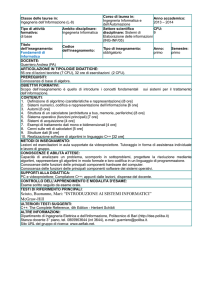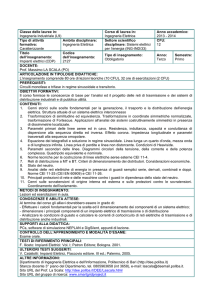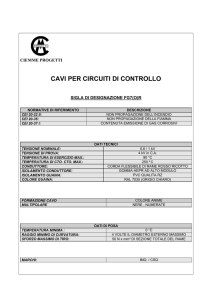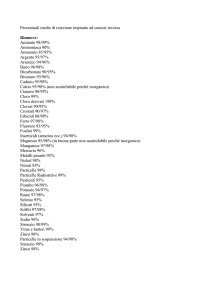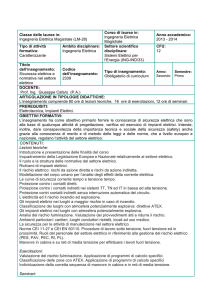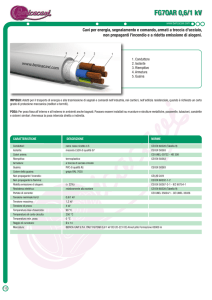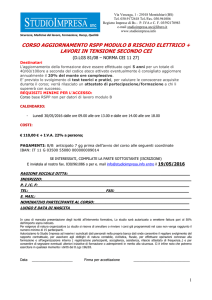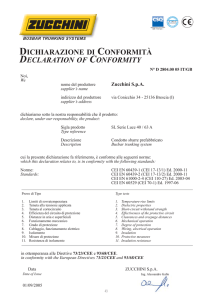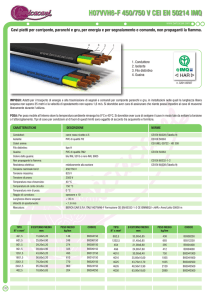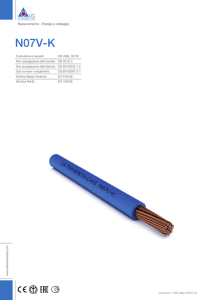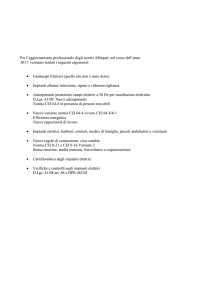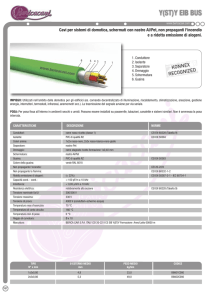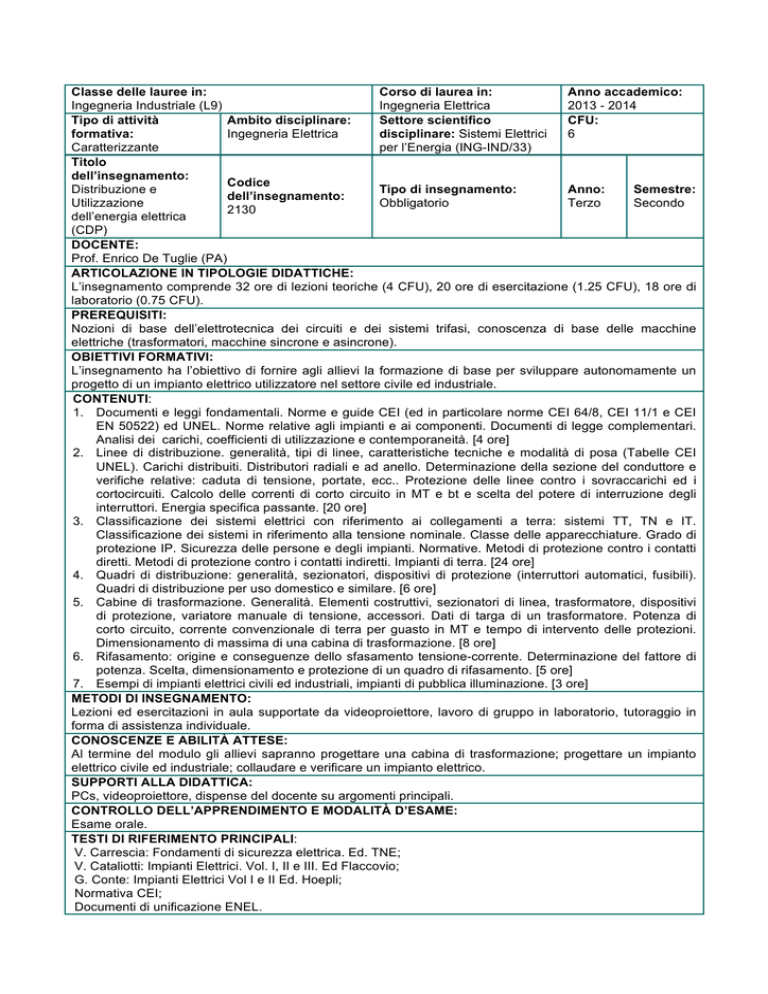
Classe delle lauree in:
Corso di laurea in:
Anno accademico:
Ingegneria Industriale (L9)
Ingegneria Elettrica
2013 - 2014
Tipo di attività
Ambito disciplinare:
Settore scientifico
CFU:
formativa:
Ingegneria Elettrica
disciplinare: Sistemi Elettrici
6
Caratterizzante
per l’Energia (ING-IND/33)
Titolo
dell’insegnamento:
Codice
Distribuzione e
Tipo di insegnamento:
Anno:
Semestre:
dell’insegnamento:
Utilizzazione
Obbligatorio
Terzo
Secondo
2130
dell’energia elettrica
(CDP)
DOCENTE:
Prof. Enrico De Tuglie (PA)
ARTICOLAZIONE IN TIPOLOGIE DIDATTICHE:
L’insegnamento comprende 32 ore di lezioni teoriche (4 CFU), 20 ore di esercitazione (1.25 CFU), 18 ore di
laboratorio (0.75 CFU).
PREREQUISITI:
Nozioni di base dell’elettrotecnica dei circuiti e dei sistemi trifasi, conoscenza di base delle macchine
elettriche (trasformatori, macchine sincrone e asincrone).
OBIETTIVI FORMATIVI:
L’insegnamento ha l’obiettivo di fornire agli allievi la formazione di base per sviluppare autonomamente un
progetto di un impianto elettrico utilizzatore nel settore civile ed industriale.
CONTENUTI:
1. Documenti e leggi fondamentali. Norme e guide CEI (ed in particolare norme CEI 64/8, CEI 11/1 e CEI
EN 50522) ed UNEL. Norme relative agli impianti e ai componenti. Documenti di legge complementari.
Analisi dei carichi, coefficienti di utilizzazione e contemporaneità. [4 ore]
2. Linee di distribuzione. generalità, tipi di linee, caratteristiche tecniche e modalità di posa (Tabelle CEI
UNEL). Carichi distribuiti. Distributori radiali e ad anello. Determinazione della sezione del conduttore e
verifiche relative: caduta di tensione, portate, ecc.. Protezione delle linee contro i sovraccarichi ed i
cortocircuiti. Calcolo delle correnti di corto circuito in MT e bt e scelta del potere di interruzione degli
interruttori. Energia specifica passante. [20 ore]
3. Classificazione dei sistemi elettrici con riferimento ai collegamenti a terra: sistemi TT, TN e IT.
Classificazione dei sistemi in riferimento alla tensione nominale. Classe delle apparecchiature. Grado di
protezione IP. Sicurezza delle persone e degli impianti. Normative. Metodi di protezione contro i contatti
diretti. Metodi di protezione contro i contatti indiretti. Impianti di terra. [24 ore]
4. Quadri di distribuzione: generalità, sezionatori, dispositivi di protezione (interruttori automatici, fusibili).
Quadri di distribuzione per uso domestico e similare. [6 ore]
5. Cabine di trasformazione. Generalità. Elementi costruttivi, sezionatori di linea, trasformatore, dispositivi
di protezione, variatore manuale di tensione, accessori. Dati di targa di un trasformatore. Potenza di
corto circuito, corrente convenzionale di terra per guasto in MT e tempo di intervento delle protezioni.
Dimensionamento di massima di una cabina di trasformazione. [8 ore]
6. Rifasamento: origine e conseguenze dello sfasamento tensione-corrente. Determinazione del fattore di
potenza. Scelta, dimensionamento e protezione di un quadro di rifasamento. [5 ore]
7. Esempi di impianti elettrici civili ed industriali, impianti di pubblica illuminazione. [3 ore]
METODI DI INSEGNAMENTO:
Lezioni ed esercitazioni in aula supportate da videoproiettore, lavoro di gruppo in laboratorio, tutoraggio in
forma di assistenza individuale.
CONOSCENZE E ABILITÀ ATTESE:
Al termine del modulo gli allievi sapranno progettare una cabina di trasformazione; progettare un impianto
elettrico civile ed industriale; collaudare e verificare un impianto elettrico.
SUPPORTI ALLA DIDATTICA:
PCs, videoproiettore, dispense del docente su argomenti principali.
CONTROLLO DELL’APPRENDIMENTO E MODALITÀ D’ESAME:
Esame orale.
TESTI DI RIFERIMENTO PRINCIPALI:
V. Carrescia: Fondamenti di sicurezza elettrica. Ed. TNE;
V. Cataliotti: Impianti Elettrici. Vol. I, II e III. Ed Flaccovio;
G. Conte: Impianti Elettrici Vol I e II Ed. Hoepli;
Normativa CEI;
Documenti di unificazione ENEL.
ULTERIORI TESTI SUGGERITI:
ALTRE INFORMAZIONI:
Dipartimento di Ingegneria Elettrica e dell'Informazione, Politecnico di Bari (http://dee.poliba.it)
Stanza docente 1° piano del Dipartimento, tel. 0805963760 (int 3760), e-mail: [email protected].
Sito del Dipartimento di Ingegneria Elettrica e dell’Informazione:
http://dee.poliba.it/DEE/Personale.html
Degree class:
Industrial engineering
Type of course
Characterizing
Disciplinary area:
Electrical engineering
First level (three year)
degree:
Electrical engineering
Scientific Discipline Sector:
Electrical Power Systems
(ING-IND/33)
Academic year:
2013 - 2014
ECTS Credits:
6
Title of the course:
Distribution and
Code:
Type of course:
Year:
Semester:
rd
nd
utilization of electrical
2130
Compulsory
3
2
energy
LECTURER:
Prof. Enrico De Tuglie (Associate Professor)
HOURS OF INSTRUCTION
Total number of hours: 70. Theory: 32 hours (4 ECTS). Numerical applications: 20 hours (1.25 ECTS).
Laboratory activity: 18 hours (0.75 ECTS).
PREREQUISITES:
Basics knowledge of electrotechnics (circuit analysis and three-phase systems), basic knowledge of electric
machines (transformers, synchronous and induction machines).
AIMS:
The course aims at providing the basic of the design for residential and industrial power systems.
CONTENTS:
8. Fundamental laws and norms. Electrical characterization of loads: load curve behaviour, utilization and
simultaneity factor. [4 hours]
9. Distribution lines. Generalities. Conductor types, technical specifications and installation conditions
(Tables CEI UNEL). Distributed loads. Radial and loop circuits. Cable sizing criteria and related tests:
voltage drop, ampacity rating, etc. Protection of the feeders against overload and short circuit.
Calculation of short-circuit currents in MV and LV distribution systems and selection of the short-circuit
current-breaking capability of the circuit-breakers. The specific let-through energy of the circuit-breaker in
correspondence with the maximum short-circuit current of the installation. [20 hours]
10. Classification of electrical distribution systems according to the types of system earthing: TT, TN and IT
systems. Classification of electrical distribution systems according to the nominal voltage. Definitions of
electric equipment classes. Degree of protection IP. Electric and functional safety. Norms. Protection
against direct and indirect contacts. Grounding. [24 hours]
11. Distribution boards. Generalities. Switch disconnectors, protection devices (such as circuit breakers,
fuses etc.) and ground leakage protection units. Distribution boards specifically designed for household
and similar applications. [6 hours]
12. Substations. Generalities. Main components of substations (transformers; circuit breakers; fuses;
disconnecting switches; circuit switchers; instrument transformers; bus; relays and instruments; auxiliary
A.C. and D.C. systems; overvoltage and lightning protection systems; grounding systems; voltage control
devices (tap-changer), power factor correction devices such as capacitors, reactors or static VAR
compensators and equipment such as phase shifting transformers). Transformer nameplate. Short-circuit
power and tripping time of protection devices. Sizing Substation transformer. [8 hours]
13. Power factor correction. Introduction to the power factor correction. Calculation of the power factor and of
the necessary reactive power. Choice, sizing and protection of capacitor banks. [5 hours]
14. Examples of design for residential and industrial power systems, and public lighting design. [3 hours]
TEACHING METHODS:
Lectures, supported by transparencies and projector, laboratory team-works, personalized feedback and
coaching to improve every aspect of the student's work.
EXPECTED OUTCOME AND SKILL:
Ability to design transformer substations, and both residential as well as industrial power systems.
TEACHING AIDS:
PCs, projector, scripts referring to principal topics.
EXAMINATION METHOD:
Oral exam.
BIBLIOGRAPHY:
V. Carrescia: Fondamenti di sicurezza elettrica. Ed. TNE (In Italian)
V. Cataliotti: Impianti Elettrici. Vol. I, II e III. Ed Flaccovio (In Italian)
G. Conte: Impianti Elettrici Vol I e II Ed. Hoepli (In Italian)
Normativa CEI (In Italian)
Documenti di unificazione ENEL (In Italian)
FURTHER BIBLIOGRAPHY:
FURTHER INFORMATION:
Department of Electrical and Information Engineering, Politecnico di Bari (http://dee.poliba.it)
st
Lecturer room at 1 floor, phone 0805963760 (int. 3760), e-mail: [email protected].
URL site of Dept. of Electrical and Electronics:
http://dee.poliba.it/DEE/Personale.html

